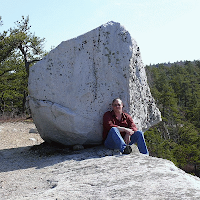There are, however, sometimes conflicts between the non-credit and credit-bearing sectors of the college. Credit courses have been adversely affected by non-credit course scheduling (there are cases of credit-bearing classes being bumped out of a classroom for a non-credit course), there are concerns that non-credit courses may siphon potential students away from credit-bearing classes (AutoCAD is offered in both credit and non-credit areas, for example), and some faculty have concerns about the types of courses being offered.
What do I mean by that last point? Let me provide a current example...
When I teach about crystals, it's in the context of lectures on atomic bonding, the geologic definition of a mineral, the different classes of non-silicate and silicate minerals, the physical properties used to identify minerals, Steno's law of the constancy of interfacial angles, different crystal habits, etc. In other words - what centuries of scientific investigation have revealed about minerals and their crystalline forms.
Learn about crystals and how they affect your chakras as well as how to use a crystals grid for healing, a crystal pendulum for scrying, and programming crystals as gifts. Your instructor is ###.
The instructor, who goes by the title "Rev.", is a self-proclaimed psychic who also teaches Reiki (in those classes, you "see auras, track the chakras, [and] feel blocks in the auric field") and Tarot.
So, what's the problem Steve?
Well, I should start out by saying that I love minerals. I have many decorating my home, office, and even an agate slice hanging from the rear view mirror of my car. Crystals are a thing of beauty and there are a few I am especially attached to and which have meaning for me. Of course, when I'm not feeling well, I'll visit a doctor and take any prescription drugs he thinks would help. I don't place some hematite on a string around my neck magically hoping it will make my blood pressure go down (although I believe the placebo effect is much more powerful than most people give it credit for).
I also don't really have a problem with what people believe. I have many beliefs of my own which are not supported by science. I do, however, have a problem when such beliefs affect others - examples include people who don't vaccinate their children endangering the public health or religious cranks who insist on teaching, in public school classrooms, that our ancestors played with dinosaurs before the great flood of Noah.
I also don't think beliefs completely unsupported by evidence (crystal healing, for example), should be given stature by being offered as a course on our campus and listed in a catalog with the college's name and logo. It's one thing to say "I took a course in Italian cooking at SUNY ## County Community College" or "I took a course in Pilates at SUNY ## County Community College". It's a bit different, in my opinion, than saying "I took a course in crystal healing at SUNY ## County Community College". Community colleges already have image problems (some people believe we have lower academic standards and are where the dumb kids go - I don't agree with this assessment but let's acknowledge it's prevalent). We don't need to further hurt our image by offering courses, even non-credit ones, like this. There's plenty of other stuff we can teach people that isn't nonsense.
Although, since teaching at a community college means I'm significantly lower-paid than our local local high school teachers (by far), and can always use some extra money, maybe I should offer to teach a non-credit course (the old, "if you can't beat them, join them" strategy). Dowsing or Water Witching. I know where there are some nice witch hazel (Hamamelis virginiana) trees. I could take students there to cut a few forked branches and we can go dowse for water. Don't tell anyone, but here in New York (especially after this summer), you can drill anywhere and hit water!
Learn the ancient art of dowsing with geology professor Steven Schimmrich. Participants will make their own dowsing rods, charge them with psychic energy, and practice dowsing for water and mineral deposits at selected locations in Ulster County. Saturday, October 1, 8, and 15 from 9:00 am - 12:00 pm. $120.
Any interest?
Wait, wait, I have a better idea. Maybe I can do crystal healing too. I can have my clients lay down on a bed (maybe I can teach in the nursing lab) and then place crystals on them (judging by the picture below, I don't even have to pay much attention to where they're placed as long as it's symmetrical).
I won't use those New Age tumbled stones either, I'll be using real mineral crystals. Unmodified and powerful with Earth energy. Not too hard to make up stories - "I will place this magnetite crystal, which I collected from a sacred vortex in the Adirondacks, over your third eye chakra. Its magnetic energy will reinforce your psychic energy by clearing blockages in the flow of your chi." A little burning sage and a nature sounds CD will set the mood. Attractive women may need to fully undress to obtain the best benefit from crystal placement ("What, you've never heard of the yoni chakra? It's very important to clear the flow of your prana there with this tourmaline crystal...").
Sounds a hell of a lot easier than trying teaching a room full of young adults about the difference between amphiboles and pyroxenes, doing program reviews for SUNY, and writing assessment plans for the Dean of Academic Affairs' Office.
Sometimes I really wish I didn't have ethical standards.





That's tough. I would respond similarly though, my major two issues being:
ReplyDelete1) It's complete BS, unsupported by scientific evidence of any sort and worthy of derision in the 21st century. Tarot, reiki, crystals ... seriously?
2) It lends an aura (pardon the pun) of credibility once pseudoscience like this gets taught at an academic institution. Sure, it's not a part of the core curriculum - but still - too much for me.
BTW, like the blog, discovered it randomly but added to my RSS reader. I too am a college geology instructor in southern NYS. Best of luck.
If you were to start a class in alchemy, I wonder how much $$$ you could make. Hum... mercurial delusions. However, an apothecary might truly be worthy. You could call it Powder Power. And yes, I am kidding. I believe in molecular bonding myself, and that there is the simple often misunderstood concept that some form of bonding between a powder molecule or crystal molecule and a human cell for there to be any reaction or consequence. On that note, what if the healing crystals you used had uranium attached to them. That would do something, right?
ReplyDeleteHave you ever visited the Mutter Museum in Philadelphia, PA?.
Being schizophrenic, here is my comment.
ReplyDeleteVersion 1: Ah, Steve. Ever the doubting thom er Steven. I would have you know that Dowsing cannot be learned, it is inherent in the individual or it is not. My grandfather could do it (for fun only) but I cannot. Then again one can find water almost anywhere in this state be drilling deeply enough.
Version 2: It's 'for informational purposes only'.
Version 3: Handwriting analysis was once considered a pseudo-science.
Version 4: revenue, Steve, revenue.
Version 5: I agree with your views on pretending that entertainment and fakery are on a par with real science. It annoys the h311 out of me. BTW: Interesting Indian reference near the end.
Disclaimer: I too teach a real subject at a Valley CC and am trained in engineering so my opinions may be biased.
PS: By a cursory deathball analysis one can discover exactly which CC you teach at.
Intuition allows for downloading the guidance in most cases not open to
ReplyDeleteour senses. Call it a still voice, a hunch or a
gut feeling - as soon as it begins occurring
you will realize that it's no accident.!
Dowsing is a tactic anyone can use to access the intuition by means of dowsing pendulum or otherwise divining rod.
I have been doing it for a number of years and I think anybody can easily learn it.
My site > pendulum dowsing
1st I find it interesting that many scientist have a huge blind spot in regards to their profession. The earth is flat was a scientific fact that would result in your death if you spoke against this fact- the sun revolves around the earth- another scientific fact both debunked. The list of scientific facts that were later proven to be wrong is extremely long and growing. In fact, many were never facts but theories that somehow morphed into scientific facts.
ReplyDeleteThe short history of Truth.
at 1st it is ridiculed
second, it is opposed violently
third, it is accepted as being self evident
Do us a favor. When you come across a subject matter that is unfamiliar please approach at a scientist. Open mind-- research known info- trials/experiments- report findings.
You are speaking/writing from ignorance- very unscientific
Actually, you're the one displaying ignorance of the history of science. The Greek Eratosthenes calculated the circumference of the spherical Earth in 200 BCE. It was the western church that taught the Earth was flat and motionless in response to certain verses in Genesis, Psalms, and elsewhere. While geocentrism made sense (it was a model that fit the observations at the time), it was replaced by heliocentrism with the introduction of new technology - the telescope around 1600.
DeleteLook, not all things ridiculed become scientific truth - sometimes it's just nonsense. And, the general rule of thumb is that extraordinary claims (like crystals can heal) requires extraordinary evidence. Show ME the peer-reviewed double-blind research trials that disprove the null hypothesis.